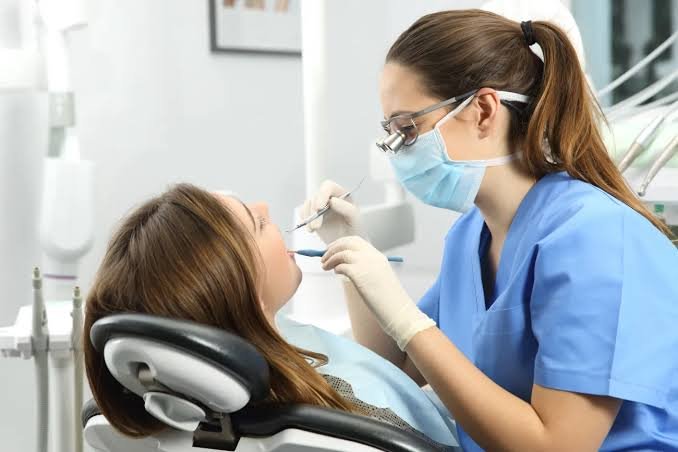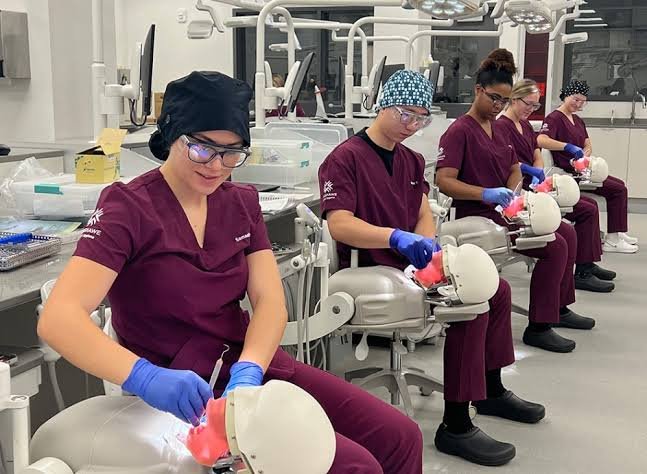Types of Dental Hygiene Programs

Accreditation and Standards
Curriculum and Course Structure
Career Opportunities and Outlook: Graduates of dental hygiene courses in Canada are in high demand across the country. Dental hygienists can work in a variety of settings, including private dental practices, community health centers, hospitals, schools, and long-term care facilities. The role of dental hygienists is expanding, with opportunities to specialize in areas such as orthodontics, periodontics, or public health.
Licensure and Continuing Education: To practice as a dental hygienist in Canada, graduates must pass the National Dental Hygiene Certification Exam (NDHCE) and obtain licensure from their provincial or territorial regulatory authority. Continuing education is also an important aspect of a dental hygienist’s career, as it ensures they remain up-to-date with the latest advancements in dental science and clinical practices. Many provinces require dental hygienists to complete a certain number of continuing education credits to maintain their licensure.
Financial Considerations: Tuition fees for dental hygiene courses in Canada vary depending on the institution and program level. Diploma programs at community colleges tend to be more affordable, while bachelor’s and advanced degree programs at universities can be more expensive. In addition to tuition, students should consider costs for textbooks, supplies, and clinical uniforms. Scholarships, bursaries, and financial aid are available at many institutions to help offset these costs.
How to Scout for the Best Dental Hygiene Courses in Canada

First make sure the program has been certified by the Commission on Dental Accreditation of Canada (CDAC), so guaranteeing high-quality education and exam preparation for the National Dental Hygiene Certification Board (NDHCB). Then evaluate the curriculum to make sure you get clinical experience to hone your practical skills and that all required topics are thoroughly addressed.
Consider scholarships, expenses connected to earning a degree, and other options. The standing of a program influences your educational experience; location is crucial for employment possibilities and clinical training. By carefully assessing these factors, you can choose the oral hygiene course most fit for your objectives and chances for success.
Institutions Offering Dental Hygiene Courses in Canada

1. University of Alberta
The University of Alberta’s School of Dentistry offers a highly respected Bachelor of Science in Dental Hygiene. This program is designed to give students a strong foundation in both the theoretical and practical aspects of dental hygiene. With state-of-the-art facilities and a focus on research, the University of Alberta prepares students to become leaders in the field. The program emphasizes hands-on experience, allowing students to practice their skills in clinical settings under the supervision of experienced professionals.
2. Dalhousie University
Located in Halifax, Nova Scotia, Dalhousie University offers a Bachelor of Dental Hygiene. The program is renowned for its rigorous curriculum, which includes courses in health promotion, disease prevention, and clinical practice. Dalhousie’s program stands out for its commitment to community service, providing students with opportunities to engage in outreach programs and gain practical experience. Students also benefit from the university’s strong ties to the dental community, which can be invaluable for networking and career development.
3. University of British Columbia (UBC)
The University of British Columbia offers a comprehensive dental hygiene program through its Faculty of Dentistry. UBC’s Bachelor of Dental Science in Dental Hygiene is one of the most sought-after dental hygiene courses in Canada. The program is designed to develop critical thinking, ethical decision-making, and advanced clinical skills. Students at UBC have access to world-class facilities and can participate in research projects that contribute to the advancement of the field. The program also places a strong emphasis on community engagement and interprofessional collaboration.
4. Fanshawe College
Fanshawe College in London, Ontario, offers an advanced diploma in dental hygiene. This program is ideal for those looking for a more hands-on, practical approach to learning. Fanshawe’s curriculum is designed to provide students with the skills necessary to succeed in a fast-paced clinical environment. The program covers a wide range of topics, including oral health assessment, preventive dentistry, and therapeutic care. Fanshawe’s strong ties to the local dental community provide students with excellent opportunities for internships and job placements.
5. George Brown College
George Brown College in Toronto, Ontario, offers a well-regarded diploma in dental hygiene. The program focuses on practical skills and real-world experience, making it one of the top dental hygiene courses in Canada. George Brown’s program includes a mix of classroom instruction and clinical practice, with a particular focus on community health and patient care. The college’s partnerships with local dental practices and community organizations allow students to gain hands-on experience in a variety of settings, preparing them for a successful career in dental hygiene.
6. Southern Alberta Institute of Technology (SAIT)
The Southern Alberta Institute of Technology offers a diploma in dental hygiene that is highly regarded across the country. Located in Calgary, Alberta, SAIT’s program is known for its strong emphasis on practical skills and patient care. The curriculum includes courses in oral pathology, dental radiography, and periodontology, among others. Students also gain extensive clinical experience in SAIT’s state-of-the-art facilities, which include simulation labs and a public dental clinic. Graduates of SAIT’s program are well-prepared to enter the workforce and are highly sought after by employers.
7. Camosun College
Camosun College in Victoria, British Columbia, offers an advanced diploma in dental hygiene. The program is designed to provide students with a comprehensive education in dental hygiene, covering everything from anatomy and physiology to community health and dental materials. Camosun’s program is particularly noted for its focus on public health, with students participating in community outreach programs as part of their training. The college’s close connections with the local dental community also provide students with valuable networking opportunities and access to job placements.
8. University of Manitoba
The University of Manitoba’s College of Dentistry provides a Bachelor of Science in Dental Hygiene program. This program is one of the most comprehensive dental hygiene courses in Canada, providing students with a strong foundation in both the scientific and clinical aspects of dental hygiene. The University of Manitoba’s program emphasizes evidence-based practice, critical thinking, and ethical decision-making. Students benefit from the university’s cutting-edge research facilities and have the opportunity to participate in research projects that contribute to the advancement of the field.
9. Toronto College of Dental Hygiene and Auxiliaries
The Toronto College of Dental Hygiene and Auxiliaries offers a diploma in dental hygiene that is well-respected in the industry. The college’s program is intended to equip students with the skills and information necessary to flourish in a range of dentistry settings. The curriculum covers a wide range of topics, including oral health promotion, preventive care, and treatments. The college’s strong focus on clinical experience ensures that students are well-prepared to enter the workforce upon graduation.
10. Confederation College
Confederation College in Thunder Bay, Ontario, offers a diploma in dental hygiene that is known for its comprehensive curriculum and hands-on training. The program is designed to prepare students for a successful career in dental hygiene by providing them with the skills and knowledge needed to provide high-quality care to patients. Confederation College’s program covers a wide range of topics, including dental radiography, oral health education, and periodontal therapy. Students also gain valuable experience working in the college’s on-site dental clinic, where they can practice their skills under the supervision of experienced professionals.
11. Vancouver Island University (VIU)
Vancouver Island University offers a Bachelor of Dental Hygiene, making it one of the few institutions in Canada to offer a degree-level program in this field. VIU’s program is known for its comprehensive approach to dental hygiene education, combining theoretical knowledge with practical skills. The program includes courses in dental anatomy, oral pathology, and community health, among others. Students also have the opportunity to gain hands-on experience in VIU’s state-of-the-art clinical facilities, where they can work with real patients under the supervision of experienced professionals.
12. Ontario Tech University
Ontario Tech University offers a Bachelor of Health Science in Dental Hygiene, making it one of the most advanced dental hygiene courses in Canada. The program is designed to provide students with a deep understanding of the science behind dental hygiene, as well as the practical skills needed to provide high-quality care to patients. Ontario Tech’s program is particularly noted for its emphasis on research and evidence-based practice, with students having the opportunity to participate in research projects and contribute to the advancement of the field.
Read Also: York University: Rankings, Fees & Courses Details
The Importance of Accreditation in Dental Hygiene Courses in Canada

When choosing a dental hygiene program, it’s essential to ensure that the program is accredited by the Commission on Dental Accreditation of Canada (CDAC). Accreditation ensures that the program meets the national standards for education and training in dental hygiene. All of the programs listed above are accredited by the CDAC, ensuring that graduates are well-prepared to enter the workforce and provide high-quality care to patients.
Career Opportunities for Graduates of Dental Hygiene Courses in Canada
Graduates of dental hygiene courses in Canada have a wide range of career opportunities available to them. Dental hygienists can work in a variety of settings, including private dental practices, community health centers, hospitals, and educational institutions. Many dental hygienists also choose to pursue advanced education and training, allowing them to specialize in areas such as periodontics, orthodontics, or public health. The demand for dental hygienists in Canada is expected to continue to grow, making it a stable and rewarding career choice.
The Future of Dental Hygiene Education in Canada
As the field of dental hygiene continues to evolve, so too do the educational programs that prepare students for this career. Many institutions are now offering advanced degrees in dental hygiene, such as bachelor’s and master’s programs, allowing students to gain a deeper understanding of the field and pursue specialized areas of practice.
Choosing the right institution for your dental hygiene education is a critical step in your career journey. With so many excellent dental hygiene courses in Canada to choose from, it’s important to consider factors such as accreditation, curriculum, clinical experience, and financial considerations.
